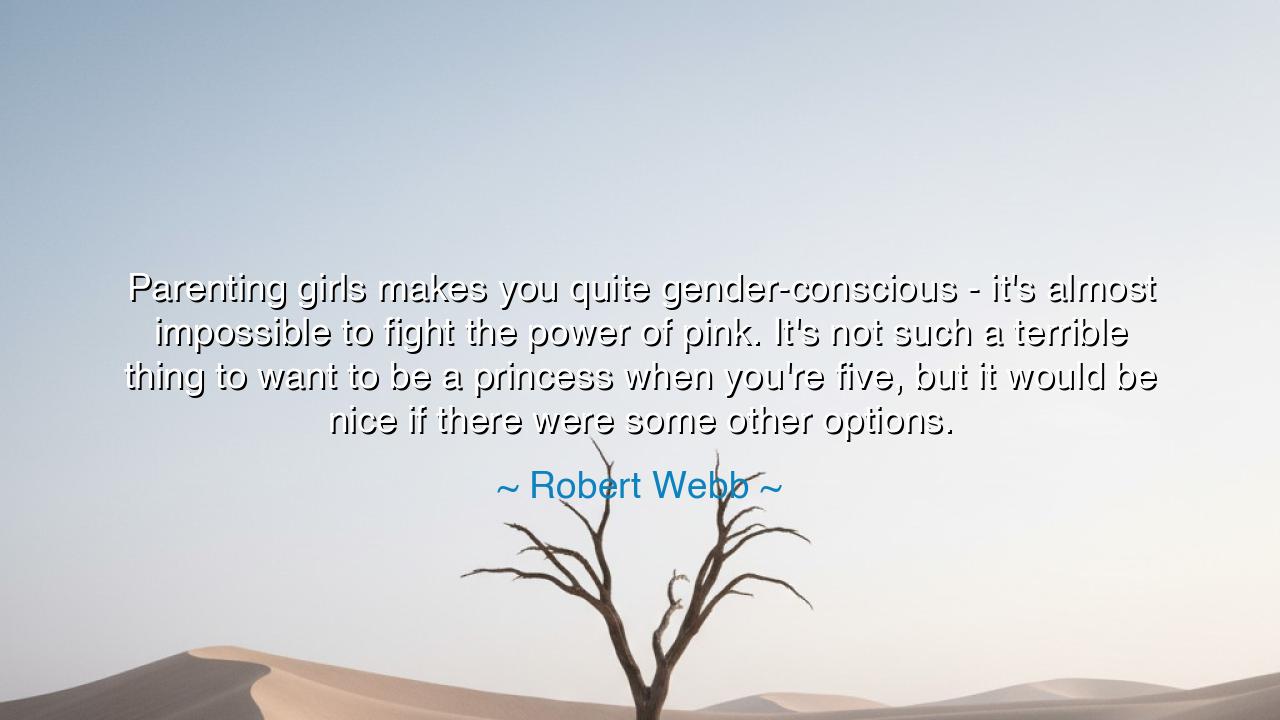
Parenting girls makes you quite gender-conscious - it's almost
Parenting girls makes you quite gender-conscious - it's almost impossible to fight the power of pink. It's not such a terrible thing to want to be a princess when you're five, but it would be nice if there were some other options.






Hear the words of Robert Webb, spoken with the weight of fatherhood upon his shoulders: “Parenting girls makes you quite gender-conscious – it’s almost impossible to fight the power of pink. It’s not such a terrible thing to want to be a princess when you’re five, but it would be nice if there were some other options.” In these words lies both tenderness and lament. For he names the innocence of childhood dreams, yet also the narrowness of the paths laid before our daughters. His reflection is not merely about color or costume, but about the unseen chains of expectation that bind the spirits of children before they even know who they are.
Parenting girls reveals to the parent the mighty forces of culture, subtle yet unyielding. From the moment they can speak, daughters are surrounded by images and symbols telling them what to desire, what to wear, and how to play. The “power of pink” is not simply a shade of color—it is the symbol of a larger order, one that dictates what it means to be feminine. Webb’s words recognize that while delighting in beauty and fantasy is natural for a child, the trouble lies when imagination is narrowed, when the horizon of possibility is shrunk to a single image: the princess, adored for her looks, but rarely for her strength, her wisdom, or her deeds.
It is no great sin for a girl of five to dream of being a princess; indeed, such dreams sparkle with innocence and joy. But what Webb longs for are “other options”—paths where girls may see themselves as warriors, explorers, inventors, leaders, or creators. For when choice is withheld, identity becomes confined, and the child may grow believing her worth lies only in beauty or charm. The danger is not in the dream itself, but in the absence of alternatives. True freedom is not the refusal of pink, but the presence of every color in the spectrum, offered without limit.
History offers us many lessons. Consider the tale of Joan of Arc, a girl who, in a world that told her to remain silent and submissive, chose instead to ride into battle and lead armies. She was no princess locked in a tower, but a commander who defied kings and claimed her voice. Yet, for centuries, her story was treated as anomaly, as miracle, instead of proof that girls, too, hold the power to shape nations. Webb’s reflection shows us that the same struggle endures, though now clothed in subtler garments: how do we raise daughters who know they may be princesses if they wish, but also generals, poets, builders, or sages?
The deeper truth of Webb’s words is that gender-consciousness is unavoidable when raising girls, for society itself presses upon them the weight of roles. Parents may resist, but the tide is strong. To deny its presence is folly; to acknowledge it, as Webb does, is the beginning of wisdom. Awareness allows us to counterbalance the tide—to affirm our daughters’ right to dream beyond the castle walls, and to carve their own destiny in fields not yet offered to them.
The lesson, then, is clear: do not forbid, but expand. Do not shame a child for loving pink, nor for dreaming of princesses. Instead, place in her hands other stories, other symbols, other heroes. Show her Amelia Earhart soaring across the skies, Marie Curie bending the secrets of science, Malala raising her voice against oppression. Let her see that the world is not only gowns and crowns, but also wings, swords, books, and voices that shake the earth.
Therefore, let all parents take heed: offer options, honor individuality, and broaden imagination. Do not fight against the princess, but make room for the captain, the artist, the dreamer, and the leader. In doing so, you grant your daughters not only freedom, but power—the power to see themselves as more than what society first offers. And in that freedom, they will not only grow, but they will transform the world.
Thus Robert Webb’s words, though spoken with humor, bear the weight of timeless truth. Parenting girls is not only about nurturing love, but about protecting possibility. And if we rise to this calling, our daughters will inherit not only the throne of princesses, but the limitless kingdom of choice.






AAdministratorAdministrator
Welcome, honored guests. Please leave a comment, we will respond soon